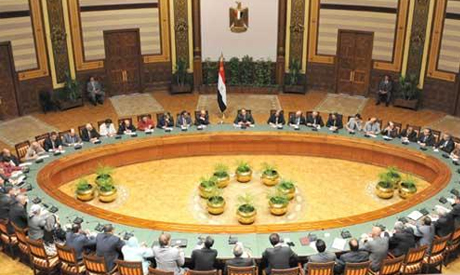
Egypt's president El-Sisi talking to the editors in chief (Al-Ahram)
Egypt's President Abdel-Fattah El-Sisi says the sudden move to increase fuel prices is a "must" to face the debt plaguing the country, Al-Ahram's Arabic website reported on Sunday. The increase in fuel and electricity prices, issued late on Friday, comes after El-Sisi ratified Egypt's annual budget with energy subsidies in mind.
The new budget managed to trim the country’s deficit by LE48 billion to register LE240 billion – or 10 percent of gross domestic product (GDP) – featuring a LE44 billion cut in energy subsidies.
In a meeting with the editors-in-chief of Egypt's most prominent newspapers on Sunday, the former military chief described a now-or-never situation, arguing that these economic decisions have to be made, despite public opinion, instead of letting the country drown in debt estimated at LE3 trillion.
The government's announcement on Friday triggered fears over likely consequent price hikes on goods and services. The highest increases are in some of the most commonly used petroleum products, ones that will have a direct effect on the cost of transportation of food and goods as well as public transportation, namely diesel and 80-octane gasoline.
The price of diesel is now at LE1.80 per liter, a 64 percent increase from the previous price of LE1.10, while 80-octane gasoline rose to 1.60 pounds per liter, a 78-percent increase from LE0.90. Natural gas for vehicles, on which most taxis rely, is now priced at LE1.10 per cubic meter, a whopping 175 percent increase from LE0.40. Early on Saturday, taxi drivers in several cities reportedly protested the price hikes, blocking a number of roads in the capital and in other governorates.
Increasing by 40 percent is the price of 92-octane gasoline, which is consumed by most average vehicles, now at LE2.60 per liter from a previous LE1.85. Though a significant increase, it is not wholly out of reach for many car owners.

Queuing for fuel (Photo Mada Masr)
For years, Egypt has been urged to restructure its wasteful and inefficient subsidy program, but successive governments have shied away from the socially sensitive move due to the anticipated political cost and the risk of social unrest. Despite this, news of the broad subsidy cuts came as a surprise to many, especially given the rate at which diesel prices have increased and the expected immediate uptick in food prices.
Prime Minister Ibrahim Mehleb said on Saturday that the increase in fuel prices will save LE51 billion in the 2014/2015 budget and that LE22 billion of that will be used to develop education and healthcare in Egypt.
In a presser held on Saturday afternoon, Mehleb added that for over 40 years no government had tackled the issue of fuel subsidies, which caused an increase in the budget deficit and poverty rates.
The Consumer Protection Agency (CPA) said that the decision may result in as much as a 200 percent in the price of some commodities, privately owned Al-Masry Al-Youm newspaper reported. Zeinab Awadallah, head of the CPA, told al-Masry al-Youm that increases in the price of fundamental items such as fuel and electricity will consequently push up the costs of transportation and shipping.
She further described the decision as random and ill-sighted, adding that new prices will anger the people.
Many criticized the timing of the decision that came during the first week of Ramadan, typically a high consumption month which already sees an increase in food prices.


.jpg)


No comments:
Post a Comment